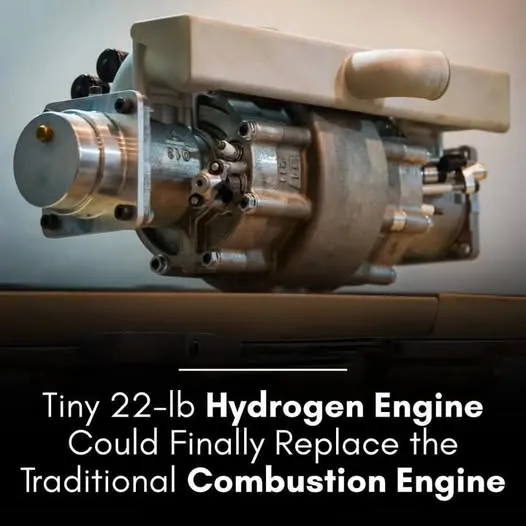New technological advancements are reshaping the transportation and energy industries as the world seeks sustainable alternatives to fossil fuels. Among these innovations, Aquarius Engines has introduced a groundbreaking hydrogen-powered engine that could challenge both traditional combustion engines and hydrogen fuel cells. This development marks a significant step toward a cleaner, more efficient future for mobility and energy production.
The Aquarius Hydrogen Engine: A Game-Changer
Aquarius Engines has unveiled a revolutionary 10 kg (22-lb) hydrogen engine with a unique design that sets it apart from conventional engines. Unlike traditional internal combustion engines, which have numerous moving parts, the Aquarius engine features a single-piston linear configuration with only 20 components and one moving part. This streamlined design makes it significantly more cost-effective and easier to maintain than traditional engines or hydrogen fuel cells.
One of the Aquarius engine's most striking advantages is its ability to operate solely on hydrogen, eliminating the need for complex and expensive hydrogen fuel cells. Austrian engineering firm AVL-Schrick has rigorously tested and confirmed the engine’s capability to run entirely on hydrogen, proving its potential as a viable alternative to conventional energy sources. By sidestepping fossil fuels and fuel cells, this innovation could drastically reduce the cost and infrastructure barriers associated with hydrogen-powered mobility.
The Hydrogen vs. Electric Debate
Despite its potential, the introduction of the Aquarius hydrogen engine comes at a time when the debate between hydrogen and electric mobility is intensifying. Some industry leaders, such as Volkswagen and Tesla CEO Elon Musk, argue that full electrification is the most efficient and sustainable solution. They emphasize the growing advancements in battery technology and the expanding electric vehicle (EV) infrastructure as key reasons to focus on electric power.
However, proponents of hydrogen technology point to its advantages, particularly in areas where battery-electric solutions face limitations. Hydrogen-powered engines and fuel cells offer longer ranges and shorter refueling times compared to EVs, making them an attractive option for heavy-duty transport, aviation, and remote power generation. Countries like Japan have invested heavily in hydrogen infrastructure, signaling that hydrogen will play a role in the future of clean energy.
Industry Support and Market Potential
Aquarius Engines’ partnerships with major manufacturers suggest that hydrogen technology is not fading away. The company has collaborated with Japanese auto parts manufacturer TPR and Honda-affiliated Musashi Seimitsu, aiming to enhance the engine’s performance and explore commercial applications. These partnerships indicate a growing interest in hydrogen-powered solutions and their potential to complement existing electric mobility strategies.
First introduced in 2014 as a power generator, the Aquarius engine has evolved into a contender for revolutionizing vehicle propulsion. If widely adopted, this lightweight and efficient engine could pave the way for a new era of sustainable mobility, reducing dependence on fossil fuels and complex fuel cell systems.
So what is the future future?
The Aquarius hydrogen engine represents a significant step toward cleaner and more sustainable energy solutions. While the hydrogen-versus-electricity debate continues, this innovation highlights the potential of alternative technologies in shaping the future of transportation. If successfully commercialized, Aquarius Engines’ hydrogen-powered engine could mark the beginning of a new chapter in the quest for sustainable mobility, offering an efficient and cost-effective alternative to traditional and electric propulsion systems.
More at: https://www.aquariusengines.com/
